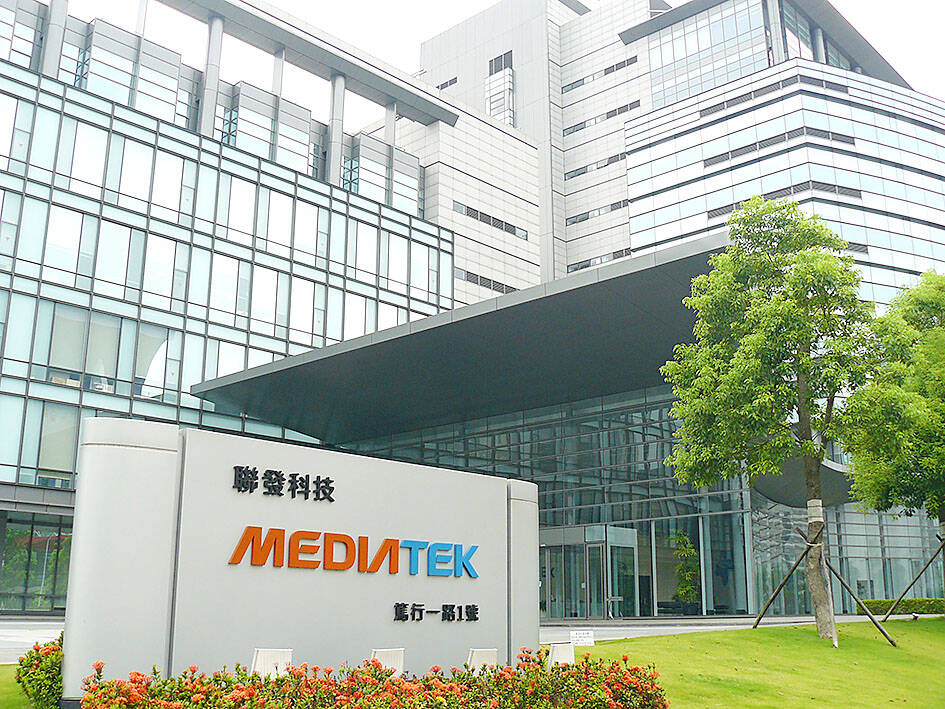Chip designer MediaTek Inc (聯發科) yesterday reported its best profit in five quarters, thanks to stronger-than-expected demand for its flagship smartphone chips.
Net profit last quarter jumped 38.9 percent sequentially and 38.8 percent annually to NT$25.66 billion (US$819.8 million), as its gross margin improved to 48.3 percent from 47.4 percent the previous quarter and 48.3 percent a year earlier.
On an annual basis, however, net profit slid 34.8 percent to NT$76.98 billion from NT$118.14 billion in 2022.

Photo: CNA
Earnings per share dropped to NT$48.51 from NT$74.95 the prior year, although the figure remains the third-highest in the company’s history, it said.
Gross margin last year slid to 47.8 percent from 49.4 percent in 2022, MediaTek said.
The Hsinchu-based company expects a “year of growth” this year, driven by its flagship smartphone chips.
Flagship smartphone chip revenue is expected to see “very strong” double-digit percentage growth this year on an annual basis, following last year’s 70 percent growth to more than US$1 billion, MediaTek said.
Gross margin is estimated to reach between 45.5 percent and 48.5 percent, the company said.
“We also observe that generative artificial intelligence [AI] is driving smartphone upgrades and creating a bigger market for flagship and high-end smartphones,” MediaTek CEO Rick Tsai (蔡力行) said at a teleconference. “The continuous 5G migration and market share expansion of our flagship chips will be key drivers for our mobile phone business this year.”
Chinese smartphone vendors Oppo Mobile Telecommunications Corp (歐珀), Xiaomi Corp (小米) and iQoo adopted MediaTek’s flagship Dimensity 9300 chip for their premium phones with generative AI features, Tsai said.
The company also extended generative AI to its premium segment with Dimnesity 8300, he said.
As the company continues to explore new growth engines, it expects several new businesses to begin volume production from late next year, he said.
With that, MediaTek sees this year as the beginning of its next growth trajectory, he added.
The company expects global smartphone shipments this year to grow at a low-single-digit percentage to 1.2 billion units, with 5G models’ penetration rate climbing to the low-60s from a high 50s in terms of percentage last year.
The company’s revenue this quarter is forecast to grow between 27 and 35 percent annually to between NT$121.8 billion and NT$129.6 billion, as inventories return to normal throughout the supply chain, it said.
Sequentially, revenue this quarter would be flat to down 6 percent from NT$129.56 billion last quarter. Mobile phone chips made up about 64 percent of last quarter’s revenue, the company said.
MediaTek yesterday promoted chief financial officer David Ku (顧大為) to double as a chief operating officer (COO), together with Joe Chen (陳冠州), ushering in a corporate structure with two COOs supervising its operations.
The personnel adjustments take effect today.

In Italy’s storied gold-making hubs, jewelers are reworking their designs to trim gold content as they race to blunt the effect of record prices and appeal to shoppers watching their budgets. Gold prices hit a record high on Thursday, surging near US$5,600 an ounce, more than double a year ago as geopolitical concerns and jitters over trade pushed investors toward the safe-haven asset. The rally is putting undue pressure on small artisans as they face mounting demands from customers, including international brands, to produce cheaper items, from signature pieces to wedding rings, according to interviews with four independent jewelers in Italy’s main

Japanese Prime Minister Sanae Takaichi has talked up the benefits of a weaker yen in a campaign speech, adopting a tone at odds with her finance ministry, which has refused to rule out any options to counter excessive foreign exchange volatility. Takaichi later softened her stance, saying she did not have a preference for the yen’s direction. “People say the weak yen is bad right now, but for export industries, it’s a major opportunity,” Takaichi said on Saturday at a rally for Liberal Democratic Party candidate Daishiro Yamagiwa in Kanagawa Prefecture ahead of a snap election on Sunday. “Whether it’s selling food or

CONCERNS: Tech companies investing in AI businesses that purchase their products have raised questions among investors that they are artificially propping up demand Nvidia Corp chief executive officer Jensen Huang (黃仁勳) on Saturday said that the company would be participating in OpenAI’s latest funding round, describing it as potentially “the largest investment we’ve ever made.” “We will invest a great deal of money,” Huang told reporters while visiting Taipei. “I believe in OpenAI. The work that they do is incredible. They’re one of the most consequential companies of our time.” Huang did not say exactly how much Nvidia might contribute, but described the investment as “huge.” “Let Sam announce how much he’s going to raise — it’s for him to decide,” Huang said, referring to OpenAI

Nvidia Corp’s negotiations to invest as much as US$100 billion in OpenAI have broken down, the Wall Street Journal (WSJ) reported, exposing a potential rift between two of the most powerful companies in the artificial intelligence (AI) industry. The discussions stalled after some inside Nvidia expressed concerns about the transaction, the WSJ reported, citing unidentified people familiar with the deliberations. OpenAI makes the popular chatbot ChatGPT, while Nvidia dominates the market for AI processors that help develop such software. The companies announced the agreement in September last year, saying at the time that they had signed a letter of intent for a strategic